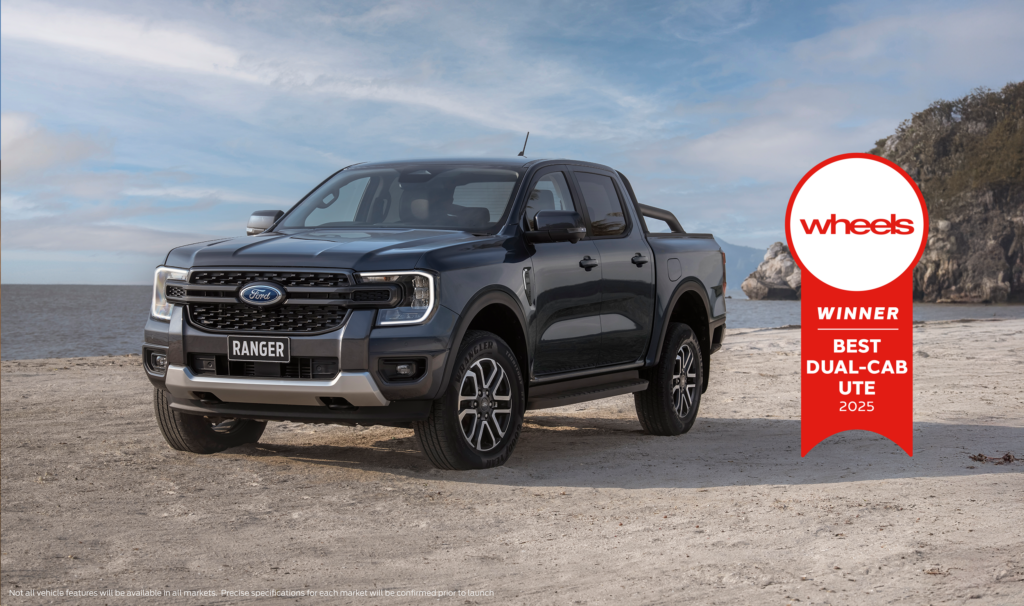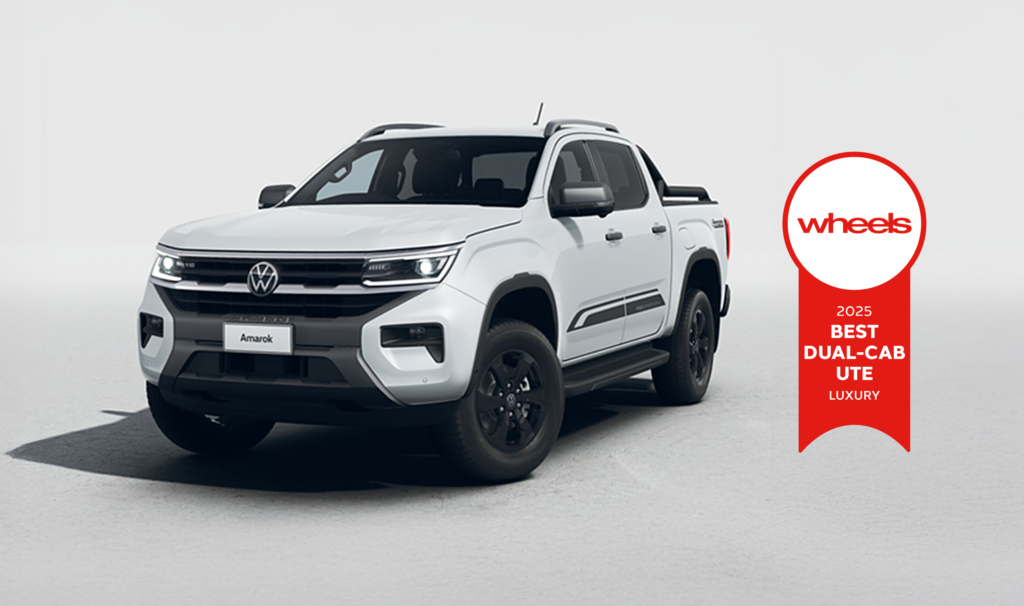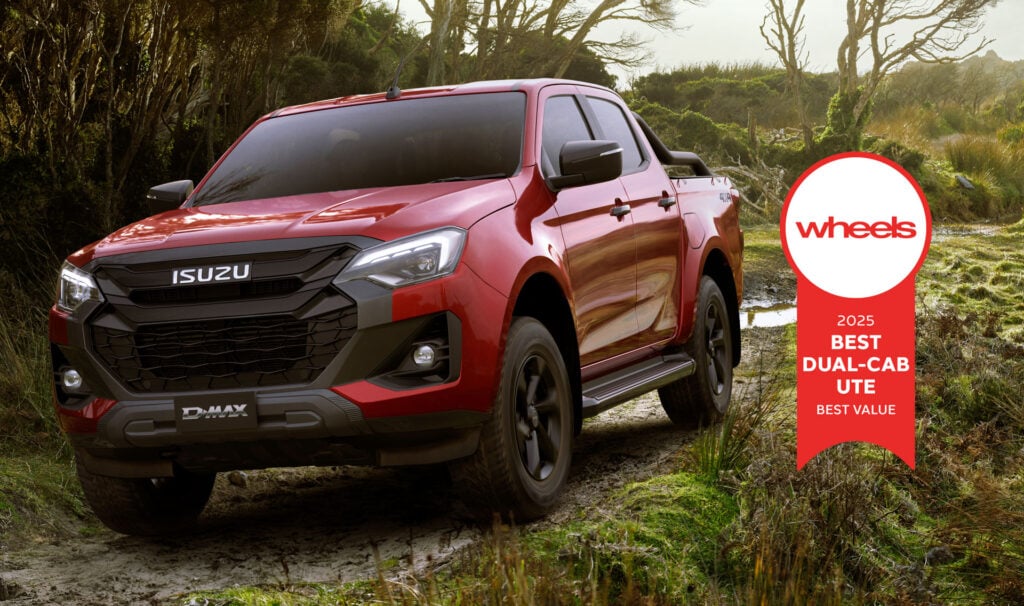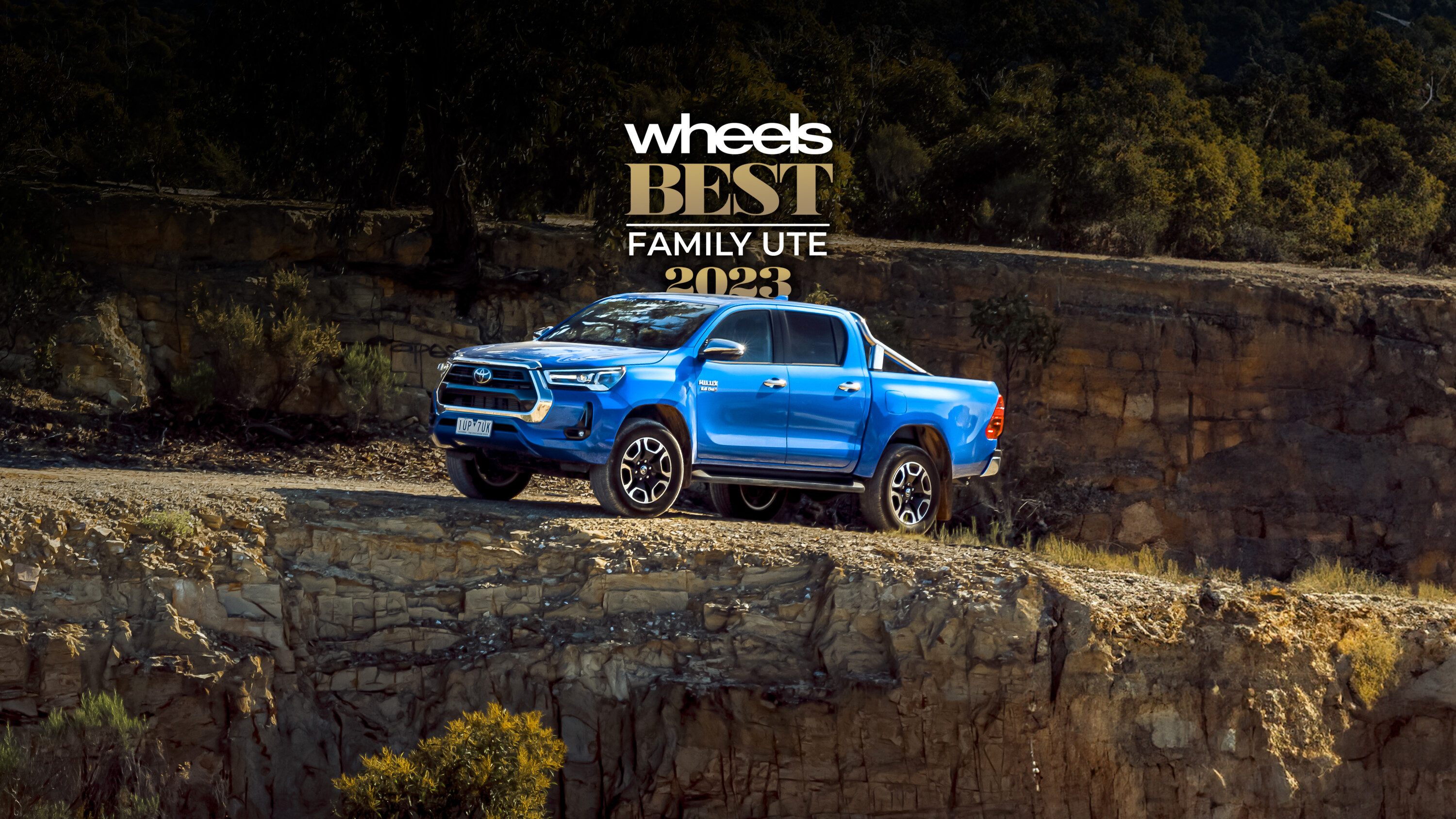
Where once the ute was a mere workhorse for trades and farms, the modern dual cab ute is now often called upon to cart about our precious ones – so safety and comfort have become significant factors.
Manufacturers have, thankfully, put plenty of effort into making utes safer, while also making the cabins of dual-cab utes more car-like than ever before.
In this Best Family Utes category comparison, we look at the best dual-cabs out there for parents.
JUMP AHEAD
- ? Toyota HiLux
- ? Mazda BT-50
- ? Isuzu D-MAX
- 4️⃣ Ford Ranger (equal 4th)
- 4️⃣ Volkswagen Amarok (equal 4th)
- 6️⃣ GWM Ute Cannon
- 7️⃣ Mitsubishi Triton
Best Utes: Read the full series
Wheels Best Utes 2023 is your ultimate guide to the top picks in this vast and varied segment.
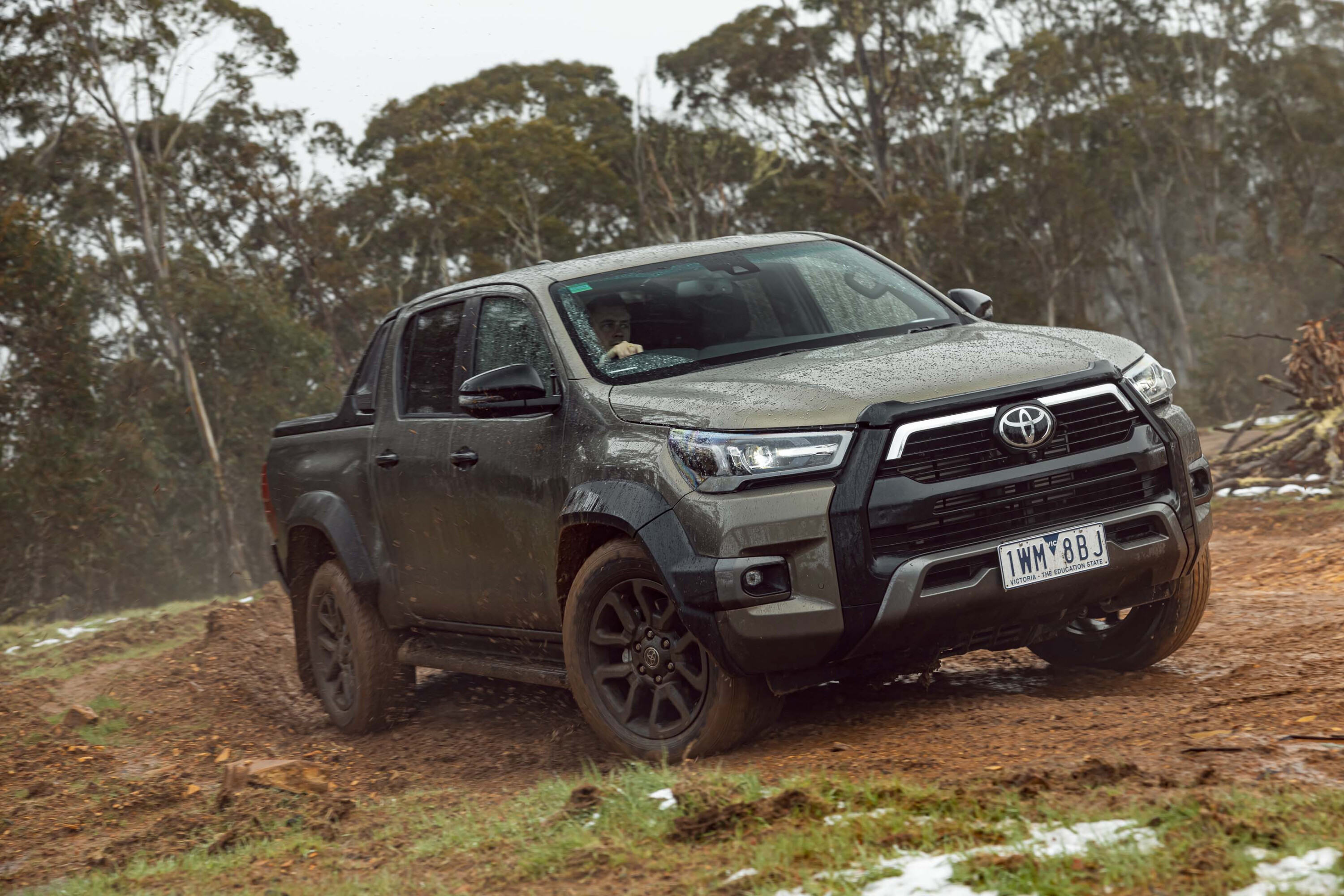
- Best Overall Ute
- Best 4×4 Ute Under $50k
- Best 4×4 Ute Under $60k
- Best 4×4 Ute Under $80k
- Best Family Ute
- Best Work Ute
- Best Ute for Towing
- Best Value 4×4 Ute
- Best Performance Ute
What we liked
- ISOFIX fittings
- Wide centre rear seat
- Some thoughtful practical interior elements
Not so much…
- Fabric top-tether loop
- No rear USBs
- Cabin design ageing
In days before ISOFIX came to the category, fitting baby seats in any ute was wrench-hurlingly frustrating – but even now, Australia being Australia, it’s still not as easy as it should be. Why? The peculiar requirement in Australian Design Rules for the fitment of a top tether.
It’s a very belt n’ braces regulation, and one that is a hangover from the days when cars were built locally.
When baby seats were mounted solely via seatbelts routed through their base, the top tether could theoretically add stability to a poorly tensioned installation. The robust lock-in ISOFIX system that leans into the strength of the vehicle’s chassis, though, doesn’t need it; in fact, it couldn’t make the requirement for a top tether any more redundant if it tried.
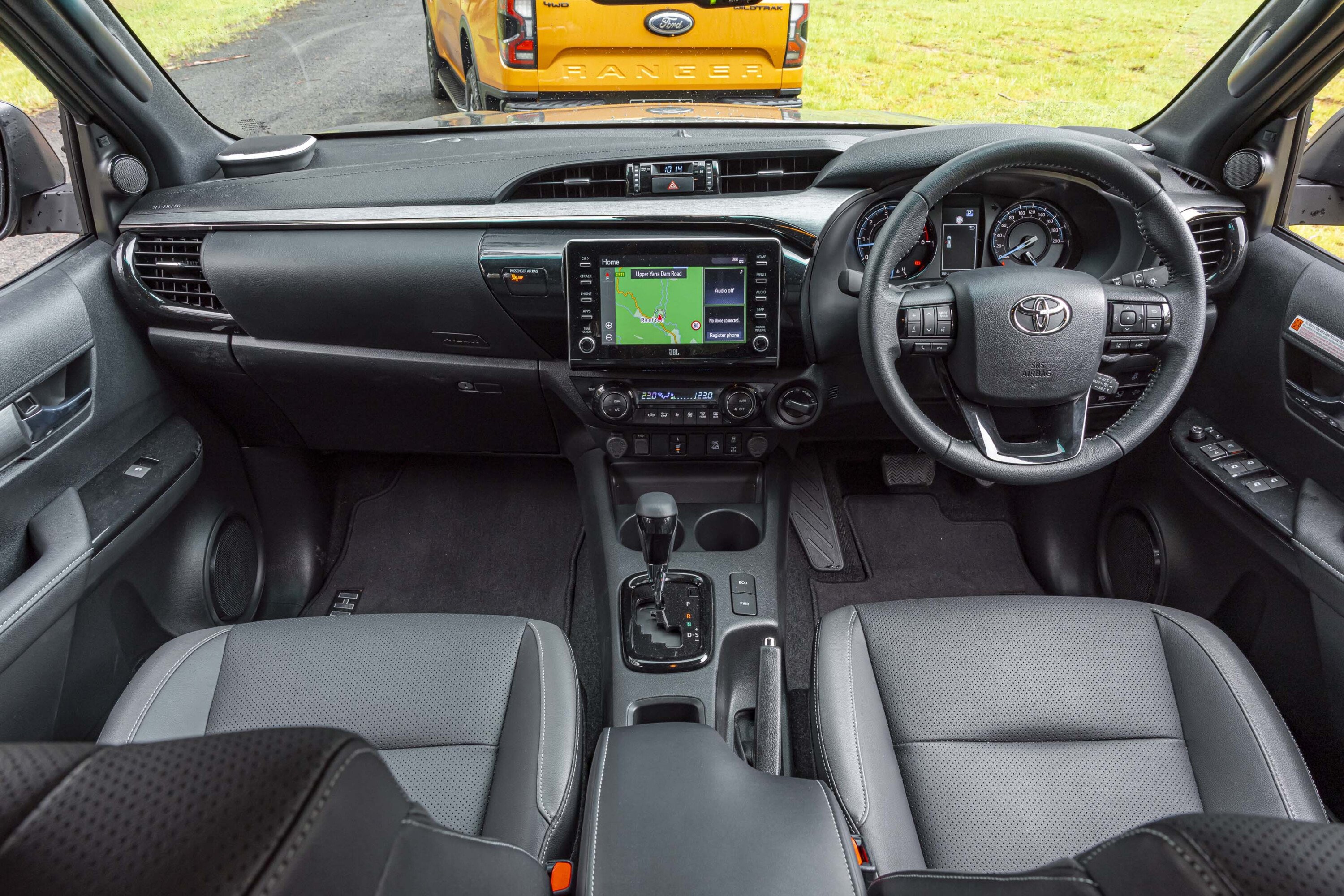
Space for baby seats and adults alike – three across!
As with most utes, adding a baby seat to the HiLux requires a bit of fiddling to access the top strap – but once it’s in place, the broad rear bench can also easily accommodate two full-size baby seats, along with the potential for a third, non-tethered booster seat.
The centre seat is sufficiently broad enough, too, that an adult can ride shotgun with the nappy bandits.
There are no USB charging points (that’s the HiLux showing its age), but the adjustable rear vents blow frosty or toasty air on demand for living cargo of any persuasion. Opting for a HiLux with PU leather upholstery will also help eradicate all manner of sins with a mere wipe, too.
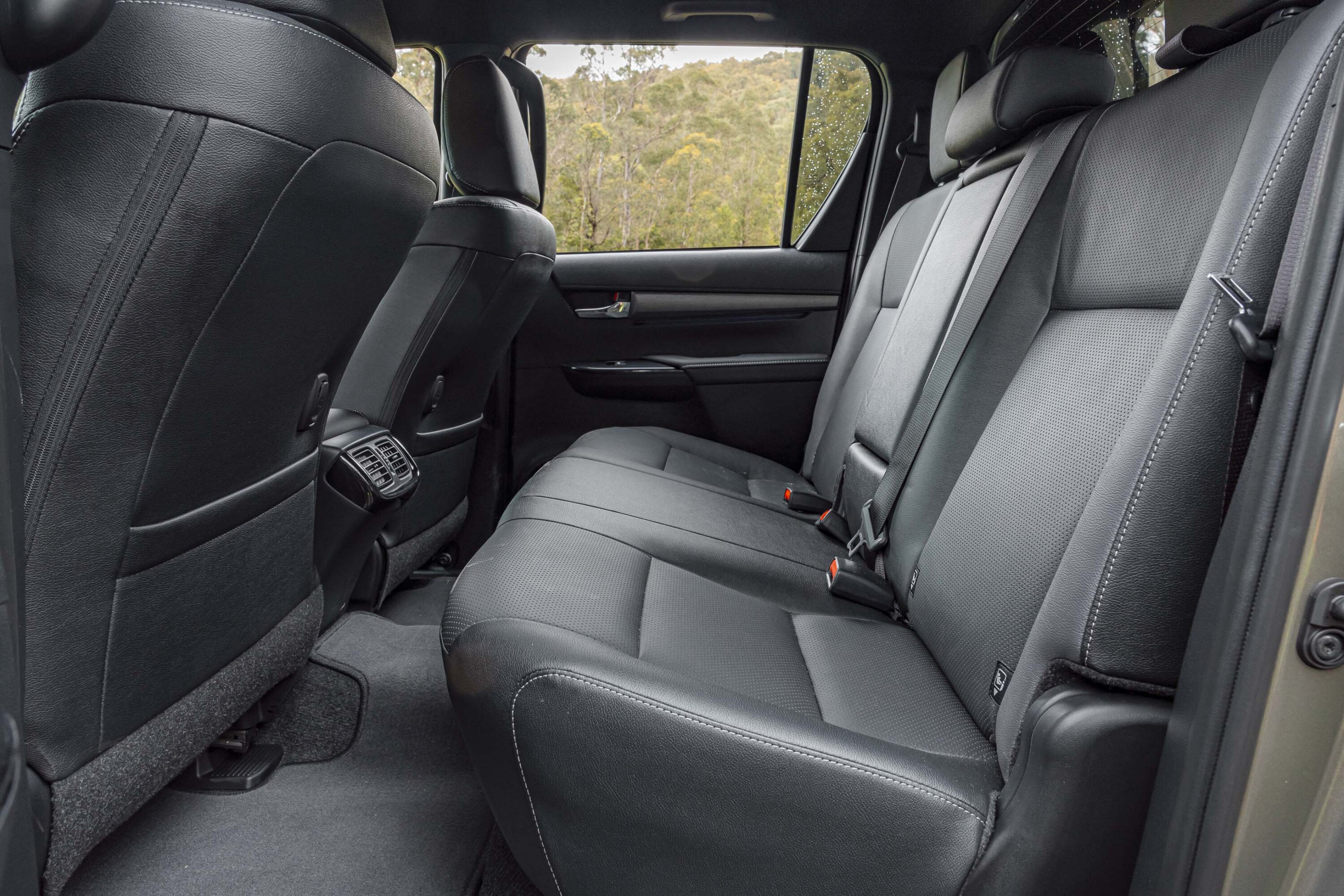
The seats themselves are comfortable and supportive. And, while rear occupants do sit quite upright, there’s plenty of headroom, toe room and shoulder room.
HiLux gets a big tick, too, for the flip-down hook on the back of the front seat to hang that bag of pad thai and kung pow chicken from.
Storage in the doors and in the centre console is adequate, but the rock-hard plastic (rather than a rubber insert) of the small trays and the two cup-holders makes a constant companion of rattling bits-and-pieces when off-roading.
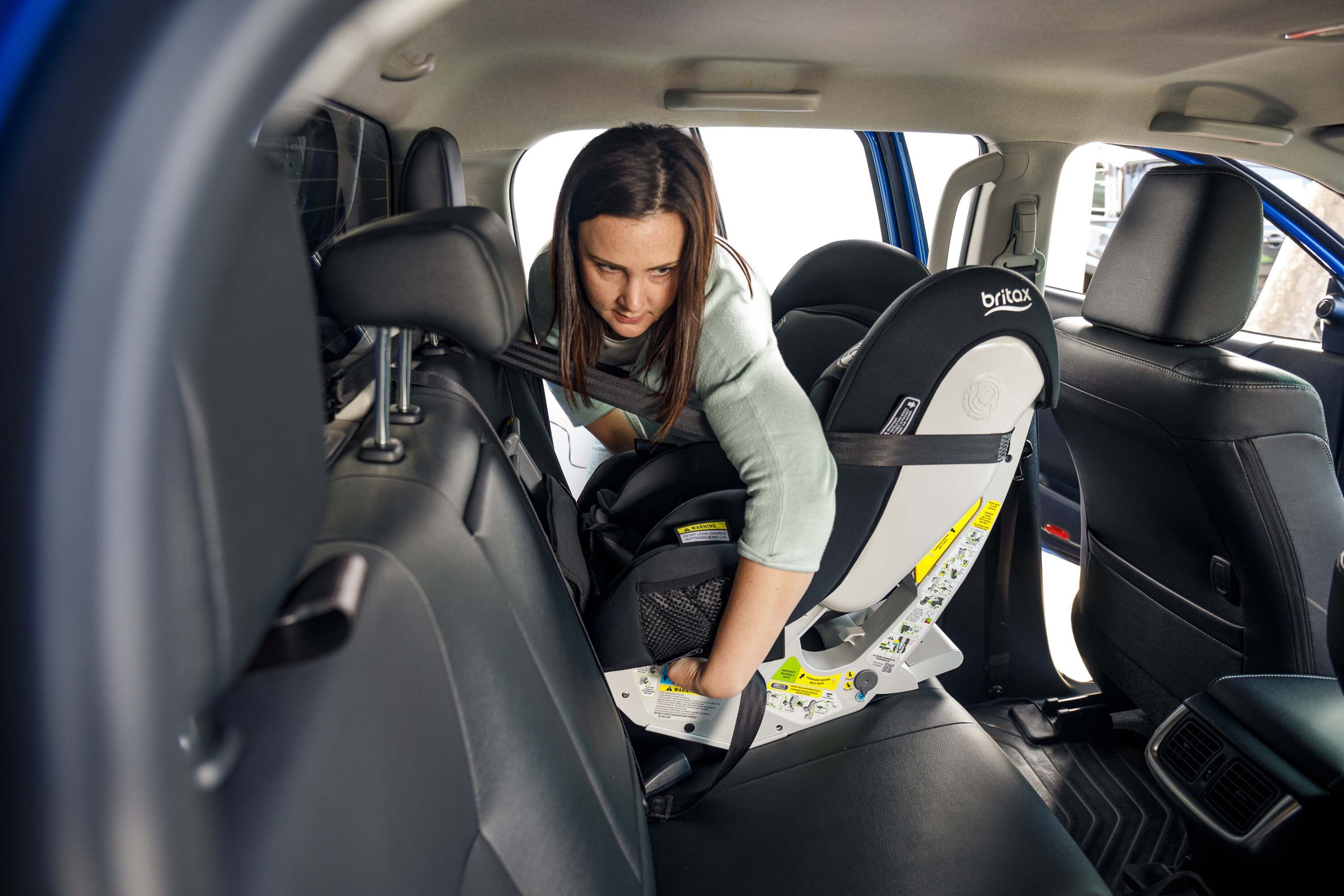
The HiLux is our Family Duties winner because, quite simply, it’s the most user-friendly and accommodating when it came to installing and securing our child seats.
It also has the widest space for an adult sitting between two child seats, and a decent amount of room in the door for drinks and toys – and who doesn’t love easily wipeable (albeit optional) leather upholstery?
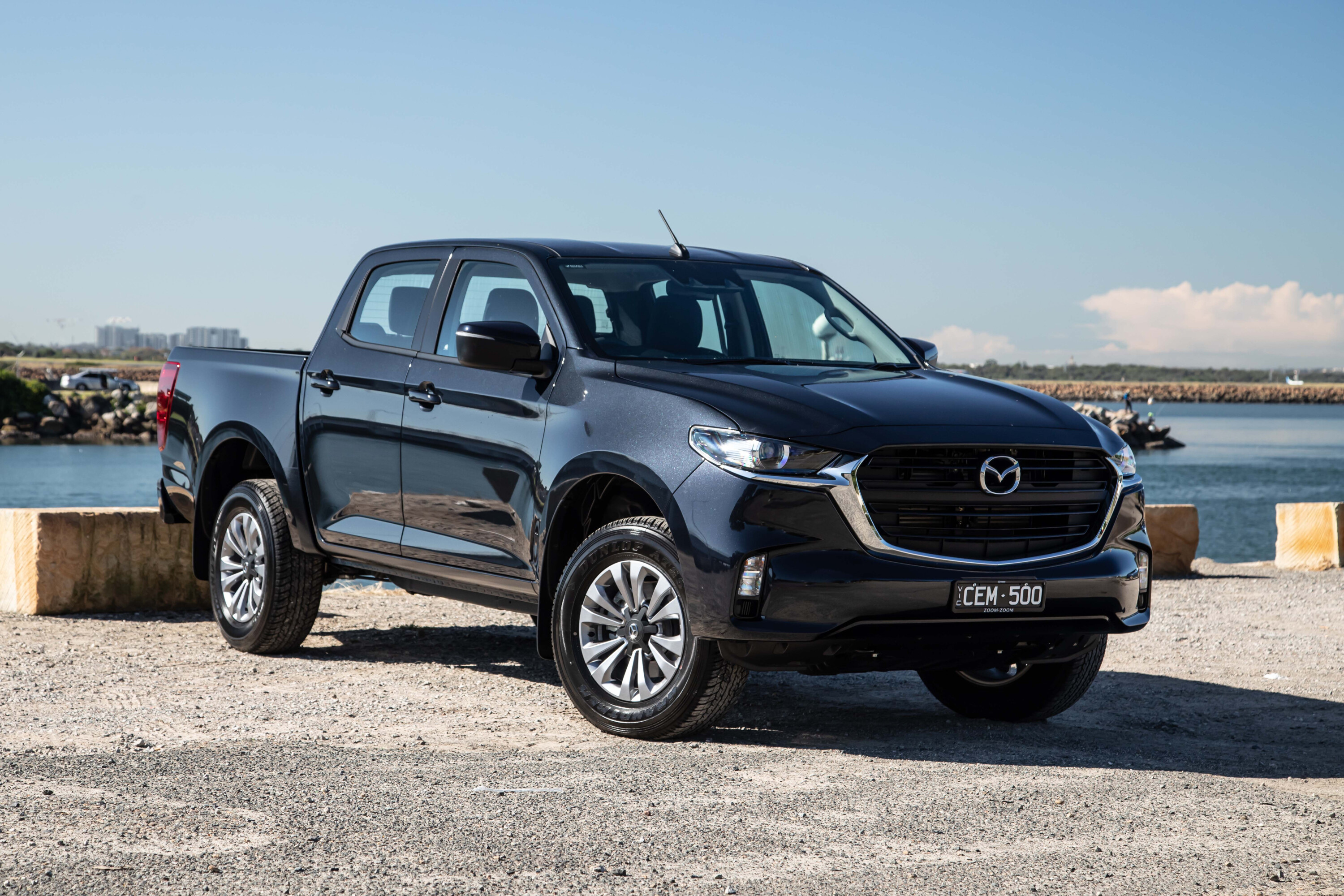
=? Mazda BT-50
Second place shared with D-Max
What we liked
- ISOFIX fittings
- Rear USB ports
- Decent seat back inclination
Not so much…
- Fabric top tether loop
- Rear-facing baby seat fitment
The twin of the Isuzu D-MAX, the Mazda BT-50 brings a classier visage to the notion of the rugged ute.
Putting a baby seat into the Mazda BT-50 is a relatively easy process, firstly because the door opens nice and wide. The tether strap which usually attaches to the seat back threads through a cloth eyelet under the outboard headrest and onto a steel tether point behind the centre headrest.
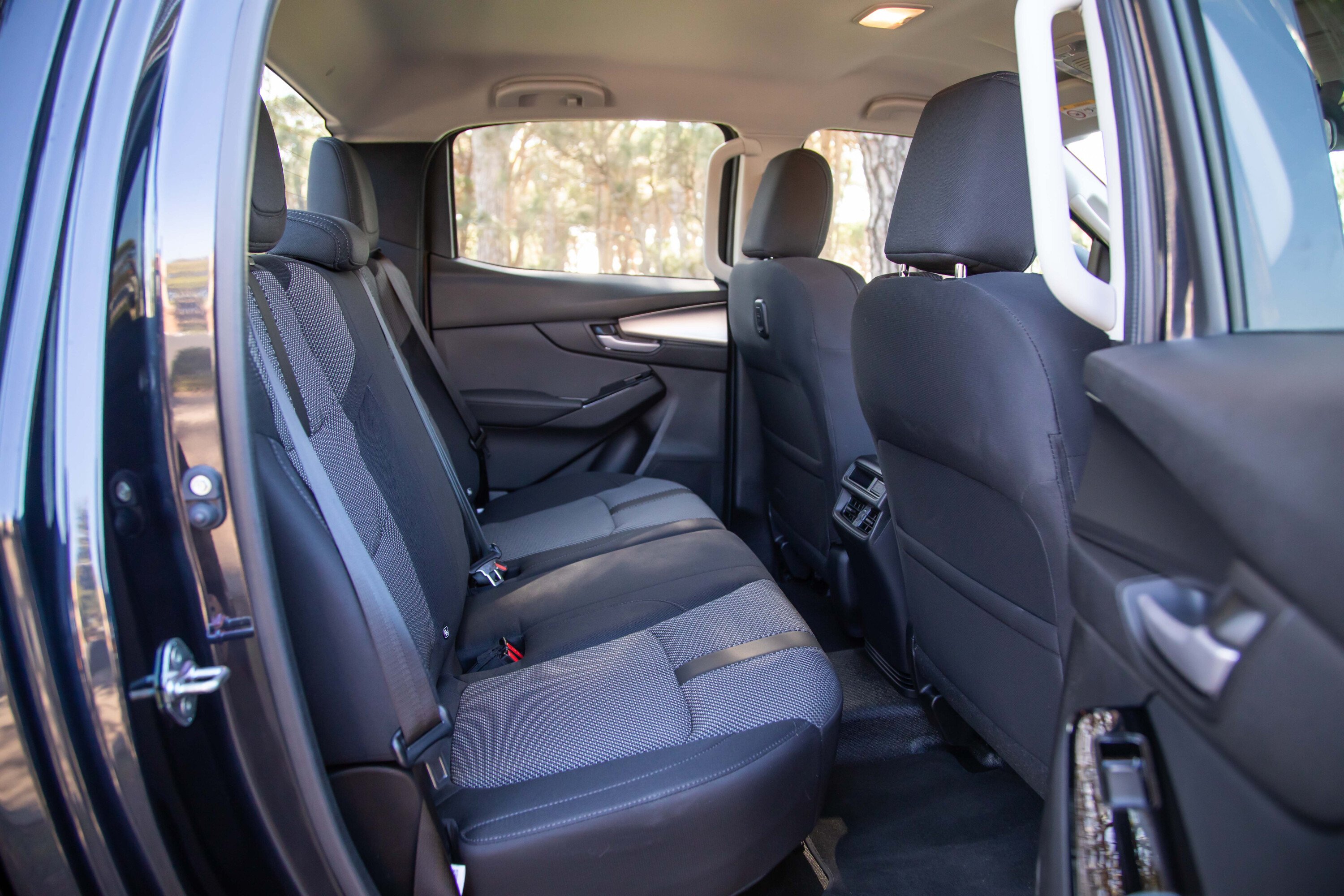
There’s room enough in the back for the baby seat without forcing the front seat passenger to slide their seat far forward, too.
On the subject of keeping the family safe, the BT-50 also has an impressive arsenal of safety kit, including the usual array of airbags, a reversing camera, autonomous emergency braking (AEB), electronic stability control, blind-spot monitoring, emergency lane keeping and lane departure warning, rear cross-traffic alert and a speed assist system.
It’s a safety suite that, along with its occupant protection capabilities in a crash, is enough to earn the BT-50 the full five-star ANCAP rating.
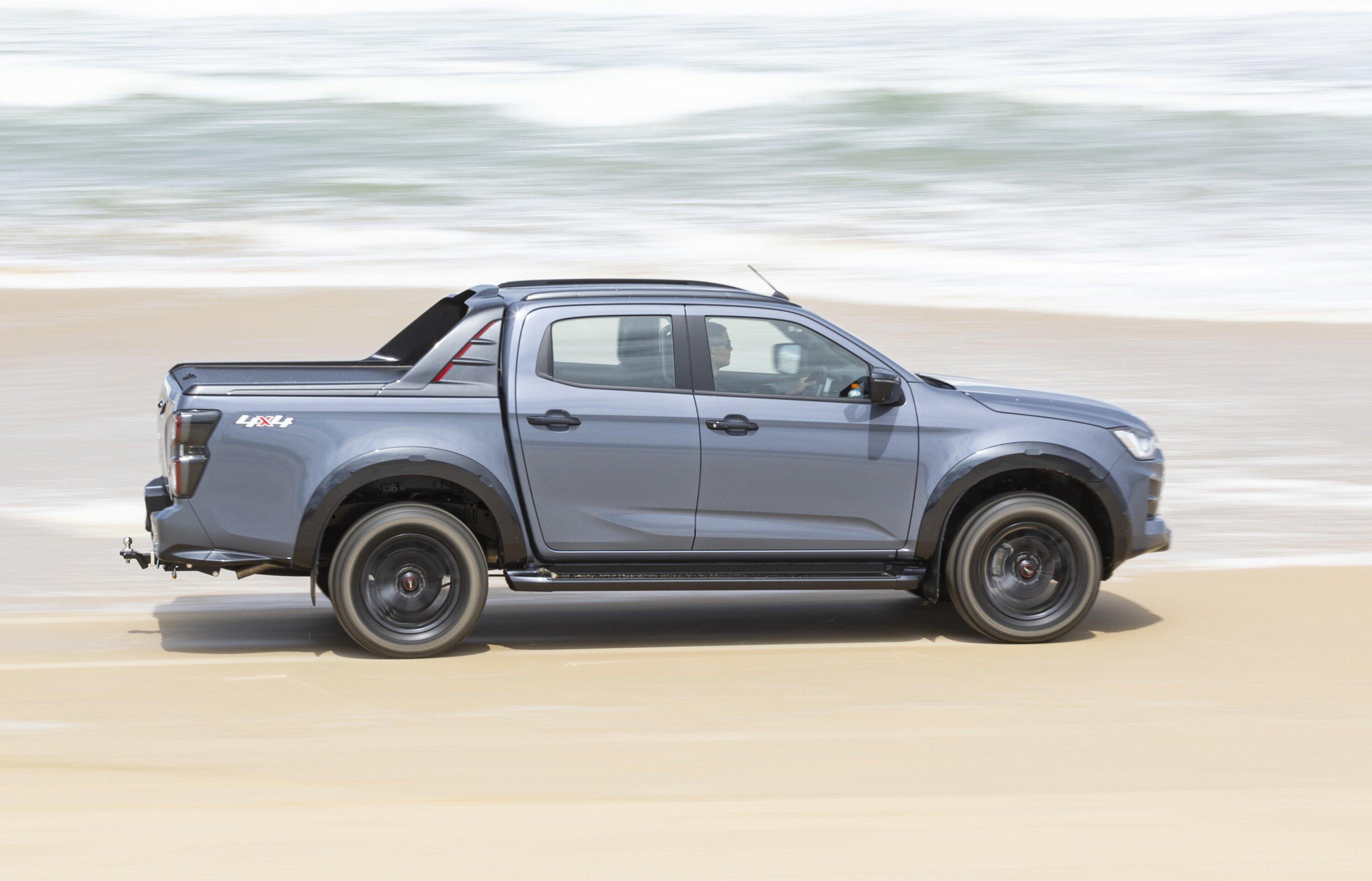
=? Isuzu D-MAX
Second place shared with BT-50
What we liked
- ISOFIX fittings
- Good knee room
- Decent seat back inclination
Not so much…
- Fabric top-tether loop
- Rear doors could open wider
Given that the D-MAX and BT-50 are twins under the skin, the same bouquets and brickbats around rear seat space can be fairly levelled at both cars.
The rear doors don’t open as wide as some other utes, which could make loading people and things a little trickier. And, as with many dual-cab utes, rear legroom isn’t particularly generous, and second-row headroom is a touch limited.
Toe space is ample, though, and the bench itself is relatively deep, if a touch short under-thigh. The seatbacks also offer decent if not class-leading recline.
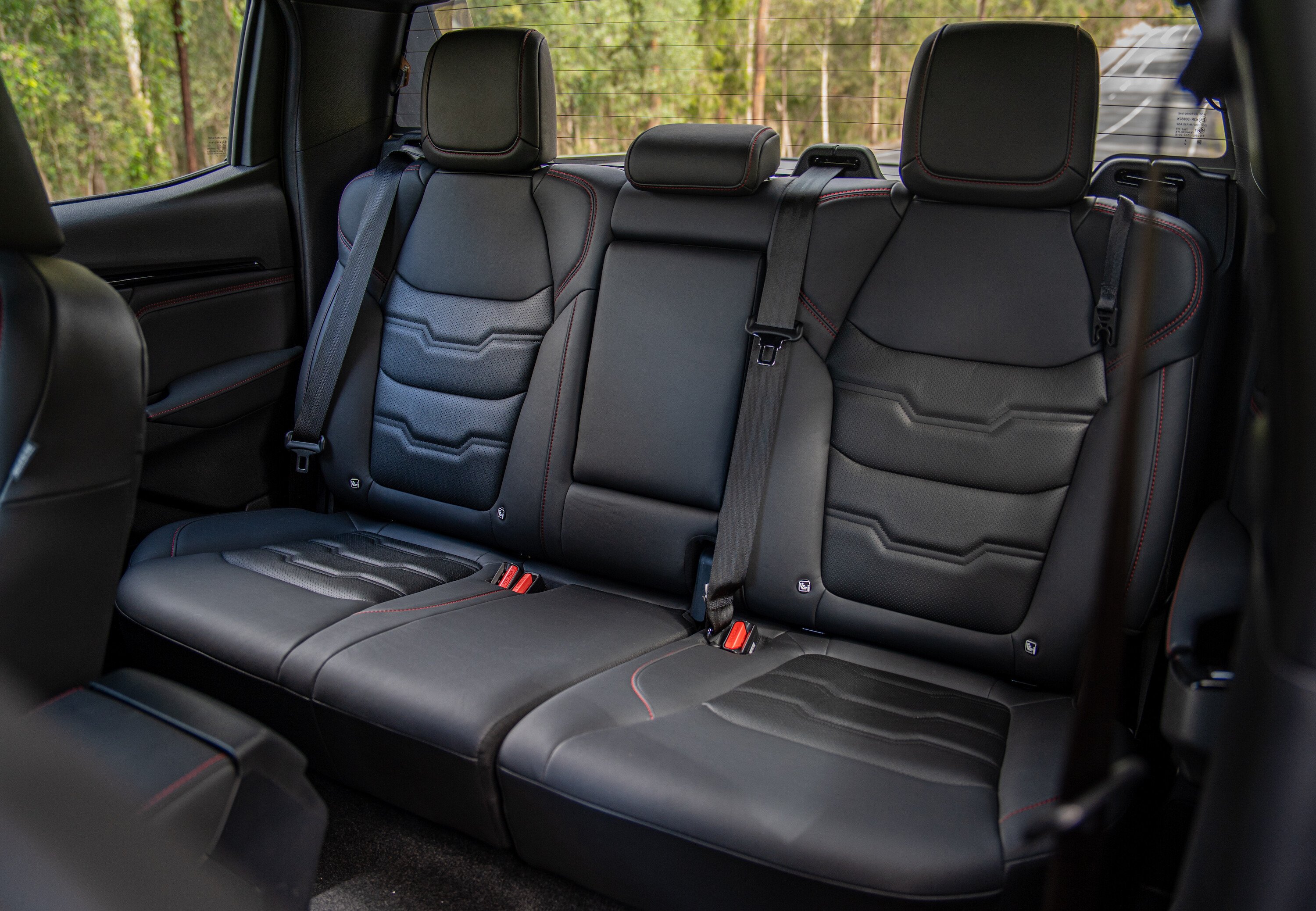
Second-row passengers are well looked after with a USB socket, door holders that will take up to 1.5L bottles, and great visibility even for smaller occupants.
Cupholders feature in the centre armrest, and seatbacks include pouches and takeaway hooks.
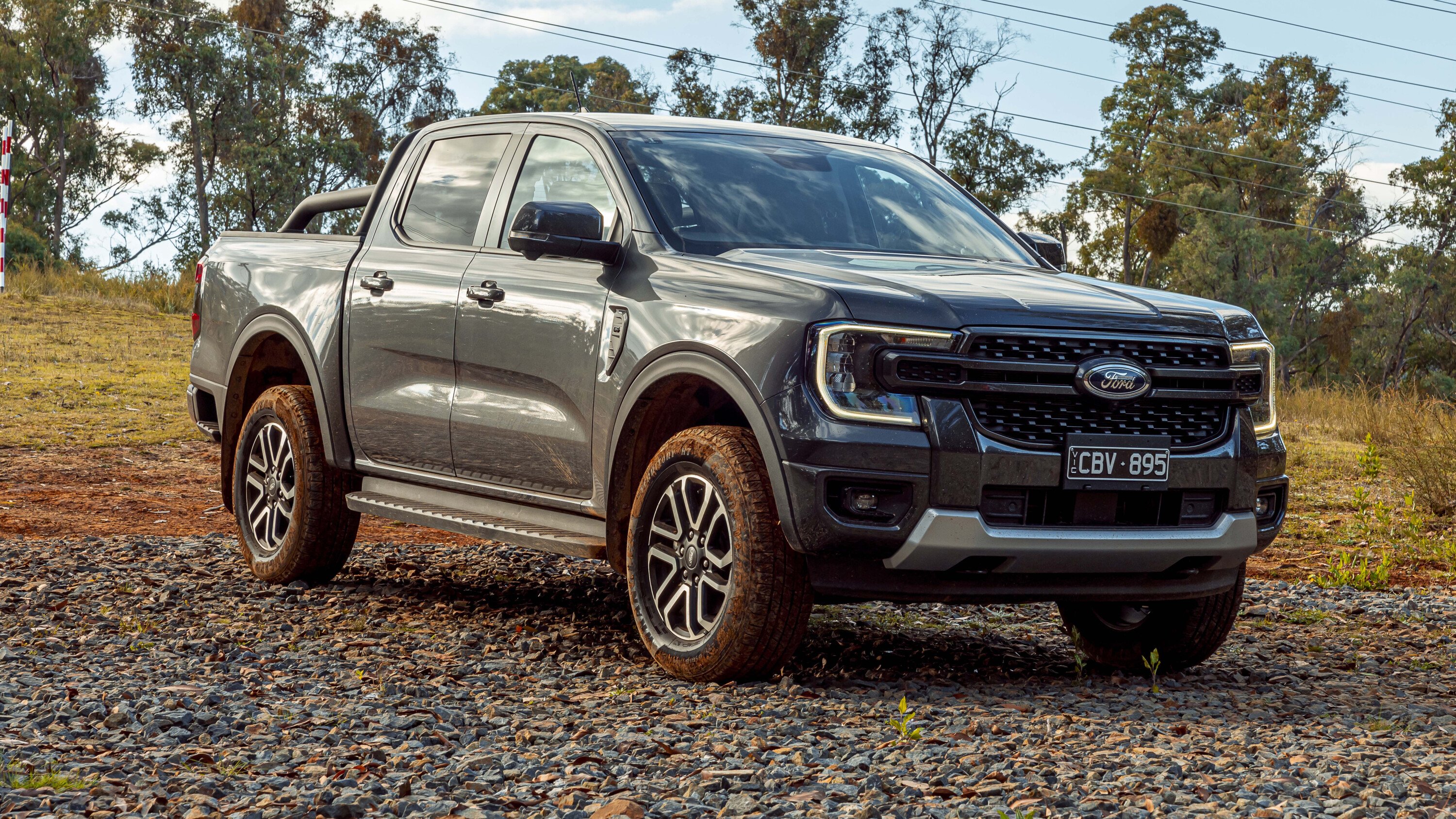
= 4️⃣ Ford Ranger
Fourth place shared with Amarok
What we liked
- ISOFIX fittings
- Rear USB ports
- Storage
Not so much…
- Soft cushioning
- Top tether access
The HiLux’s arch enemy, the Ranger, sits in the middle of the pack because, although it excels in many other fields and had some handy features like decent space in the door cards, there are a few let-downs.
They include a lack of rear legroom (including a high transmission tunnel that makes things a bit more cramped in the middle), and restricted door space.
The most problematic issue, though, is how awkward it is to fit child seats due to the difficult-to-reach top tether anchorages. It was almost impossible to fit a rear-facing seat for a newborn securely enough without seeking professional help.
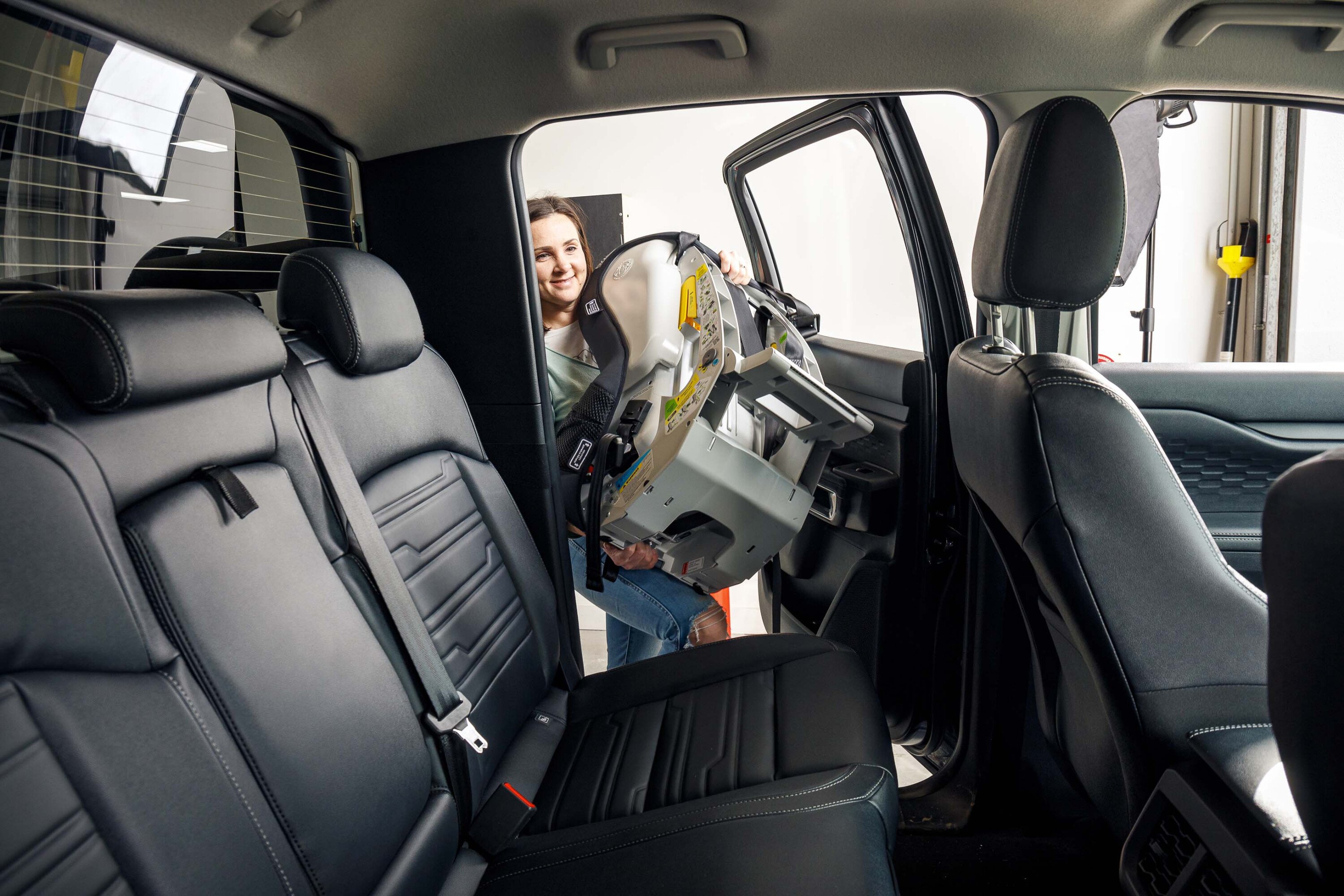
Another of our criticisms of this generation of Ranger is that its rear seat is on the squashy side for its class, though passenger room isn’t an issue.
Despite the difficulty of mounting it, a rear-facing baby seat fits easily and a fully grown adult can fit behind the driver without feeling overly compromised for knee room.
The more affordable XLT doesn’t get pockets on the front seatbacks and its very basic cloth interior isn’t wipe-down friendly.
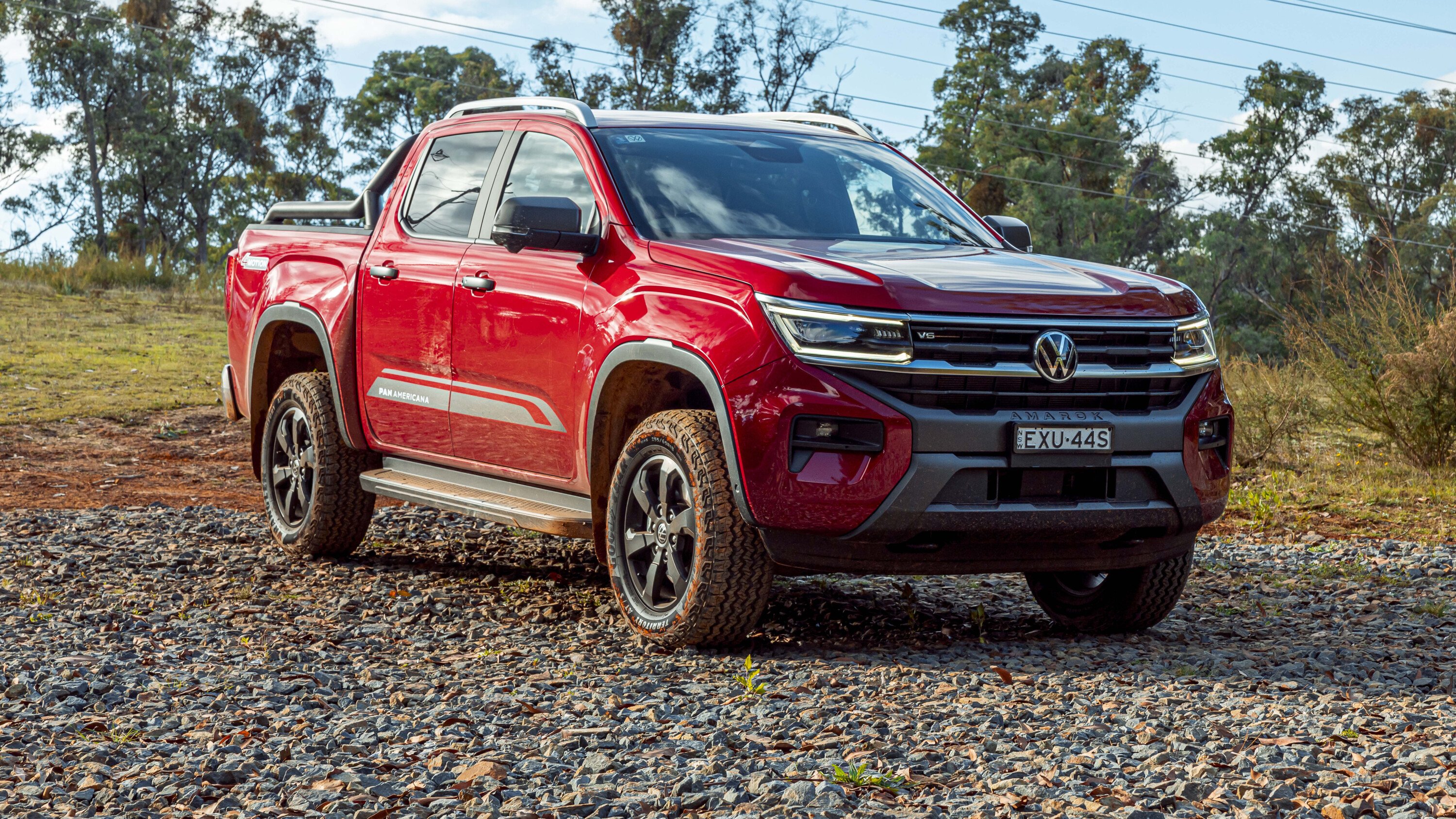
= 4️⃣ Volkswagen Amarok
Fourth place shared with Ranger
What we liked
- Now has side curtain airbags
- More room than before thanks to longer wheelbase
- Comfy, well bolstered backrest for rear passengers
Not so much…
- Fiddly to fit kid seats
- No rear USB ports
The all-new, second-gen Volkswagen Amarok was co-developed with the Ford Ranger and it’s all the better for it, especially when it comes to family duties. You now score side curtain airbags as standard, for example, which remedies one of the original Amarok’s biggest weaknesses.
And even though sharing its underpinnings with Ranger means outright passenger room is average rather than excellent, any existing Amarok owners will notice a huge improvement.
VW has injected an additional 175mm into the second-gen Amarok’s wheelbase and most of the extra space is felt in the rear pews. Six footers can easily sit behind one another and VW has done a fantastic job with the mix of materials which lends the Amarok’s cabin a premium, yet still hardwearing, feel.
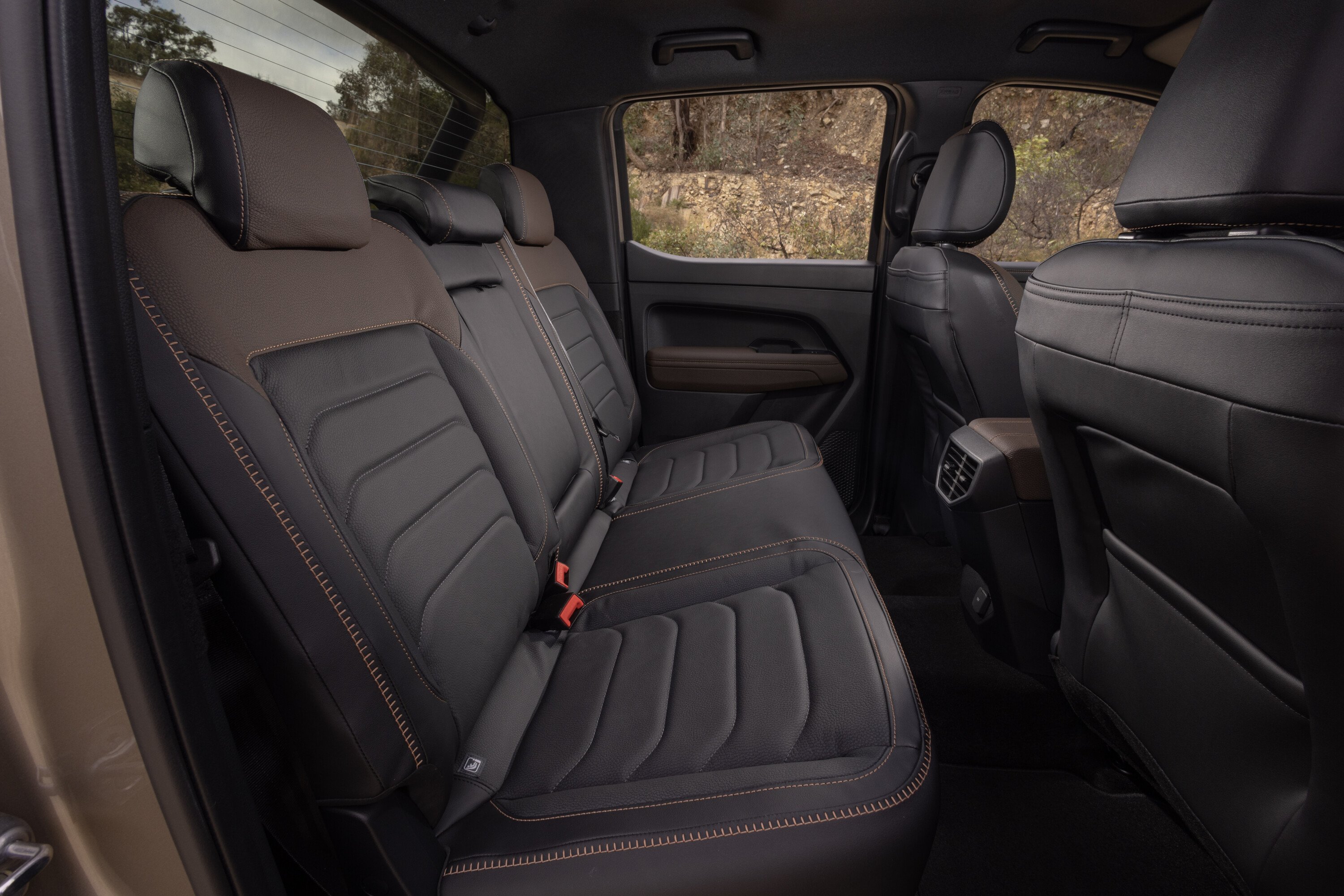
Like Ranger, fitting a child seat is fiddly and there are no rear USB ports. The rear plastics also take a sharp step backwards and are noticeably harder. Rear passengers do score dedicated air vents, though, and the Amarok’s rear bench is marginally comfier than Ranger thanks to more pronounced bolstering on the backrest.
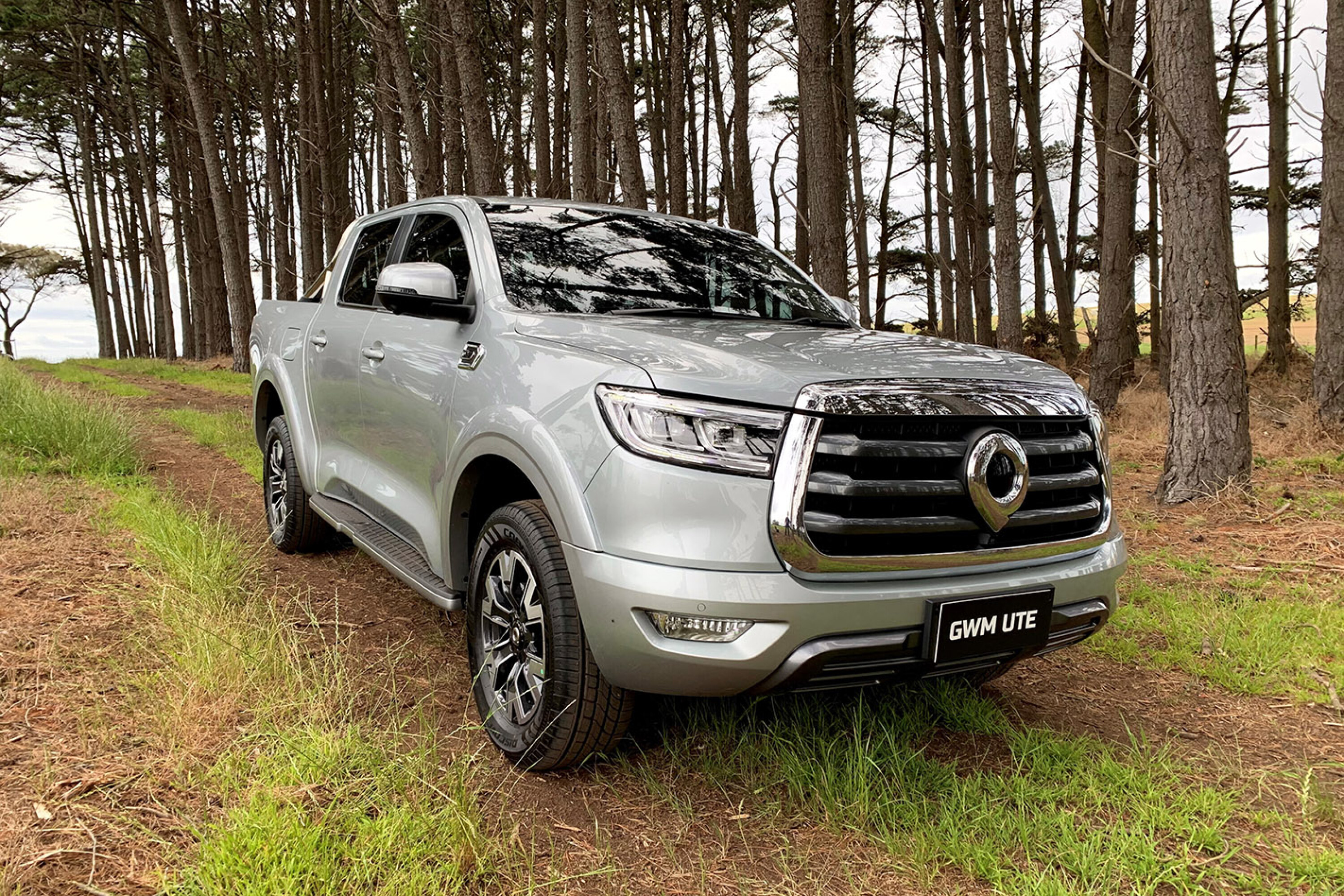
6️⃣ GWM Ute Cannon
What we liked
- ISOFIX fittings
- Decent door pockets
- 220v socket
Not so much…
- Fabric top tether loop
- Smaller rear glass
The GWM Ute Cannon is one of the leading proponents in the Chinese-sourced light-duty dual-cab space, and as such its performance for the modern family is critical.
Reports from our back seat riders confirm there’s plenty of space across the rear bench of the GWM, and the Cannon LS tested includes a 220-volt socket as well as a single USB point and rear vents.
The rear windows are a little bit smaller than those on, say, the Ranger or BT-50, which does restrict a bit of light into the rear end, but it’s only a matter of degrees.
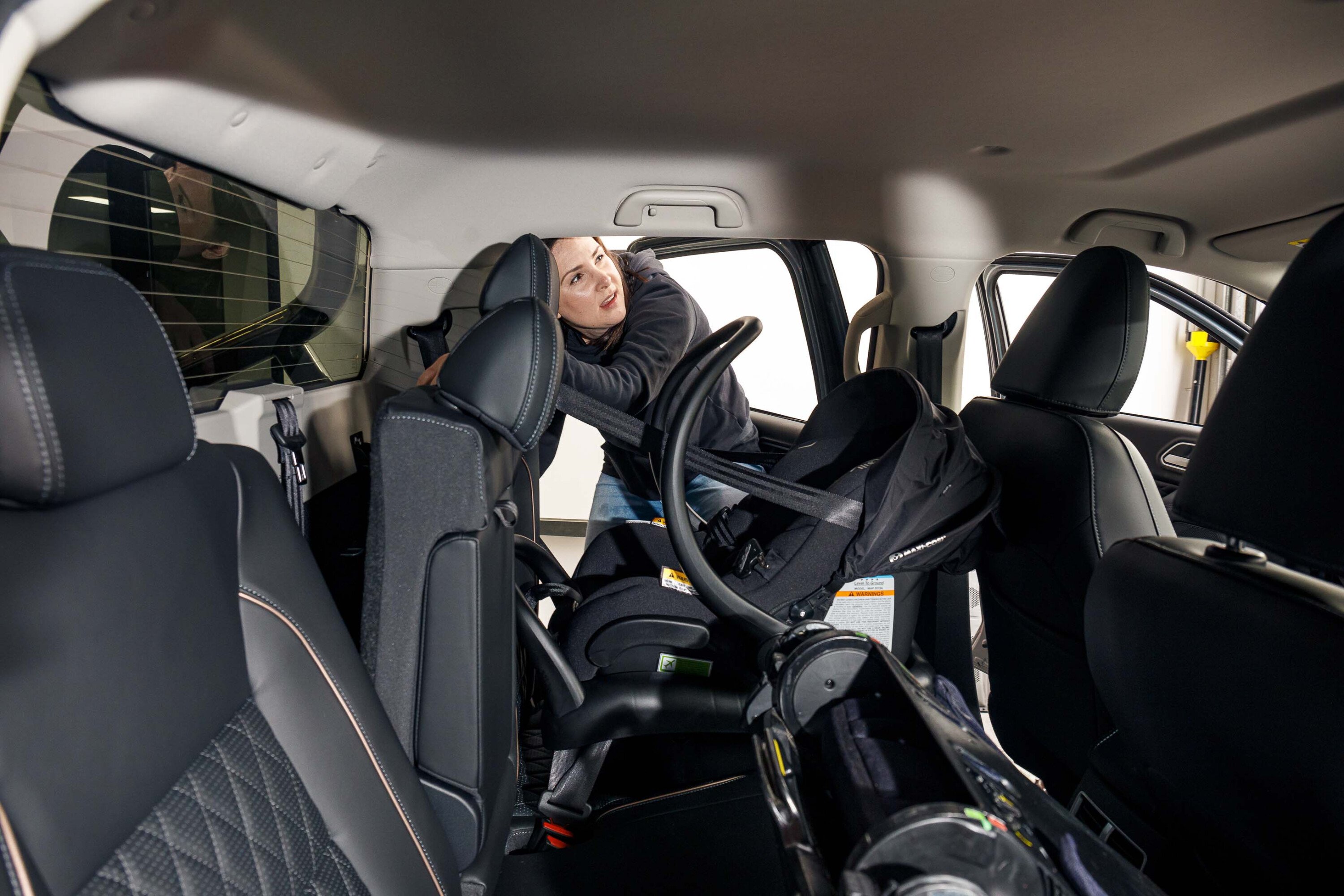
It’s also possible to add two ISOFIX baby seats to the outside seats, but you will have to fish around the rear side of the seat to find the centre seatbelt sash.
It’s an unusual two-buckle design, which will probably preclude the use of even a booster seat for the centre seat.
Offering a split rear row was one of the reasons the GWM scored well with judges, as well as offering lots of space in the doors, USB ports and pockets for rear passengers, and as well as good legroom.
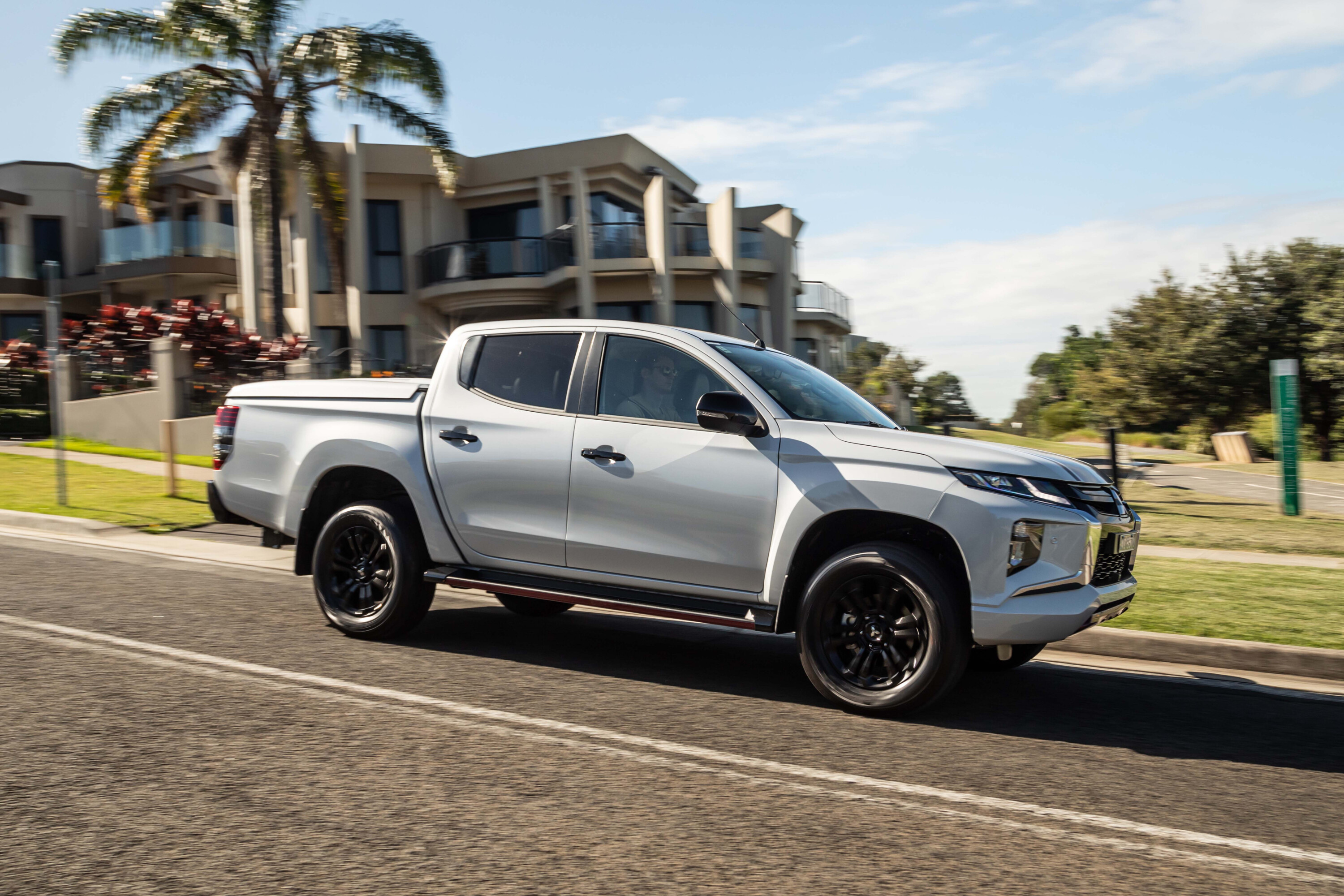
7️⃣ Mitsubishi Triton
What we liked
- ISOFIX fittings
- Decent door pockets
- Decent seat back inclination
- Wide bench
Not so much…
- Fabric top tether loop
- No rear USBs
The Triton – which is set to be updated in early 2024 – has a high transmission tunnel with only satisfactory rear legroom, with the front seats needing to be pushed forward to accommodate rear-facing child seats.
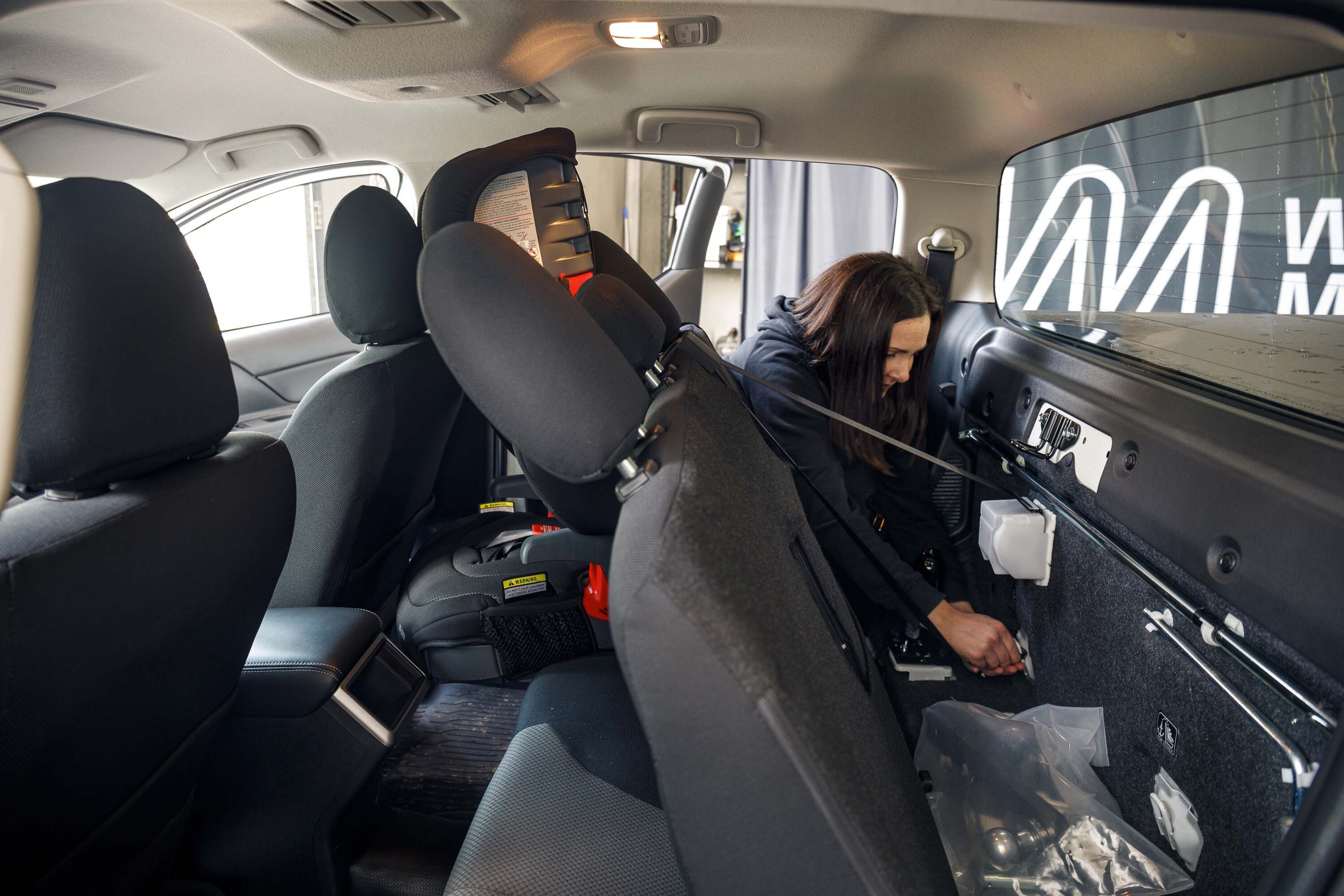
The rear door cards too don’t offer much space, and again the top tether anchorages are hard to reach.
While the models with softer leather seats are favourable compared to the basic and cheap-feeling fabric trim of the base models, both felt quite uncomfortable to sit on as an adult passenger in the middle of the second row and give a feeling of being squashed when child seats are fitted either side.
Visit our Best Utes page to find the right ute for you.
We recommend
-
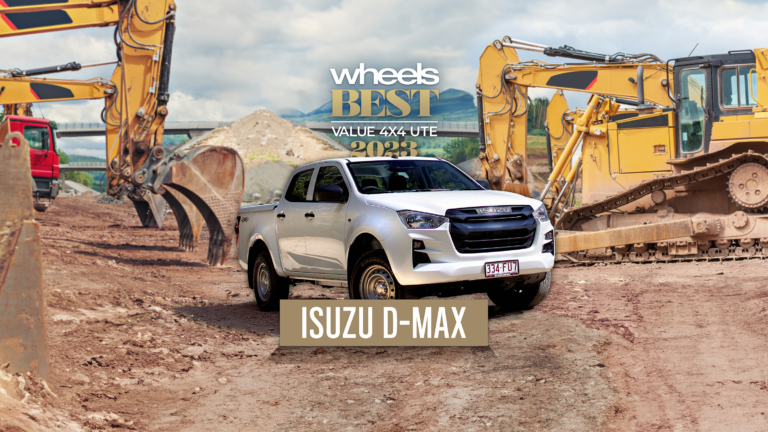 Best Utes
Best UtesBest Value 4X4 Ute: Isuzu D-MAX SX
What are the most affordable dual-cab utes to own and run? We’ve crunched the numbers to help you save some serious cash
-
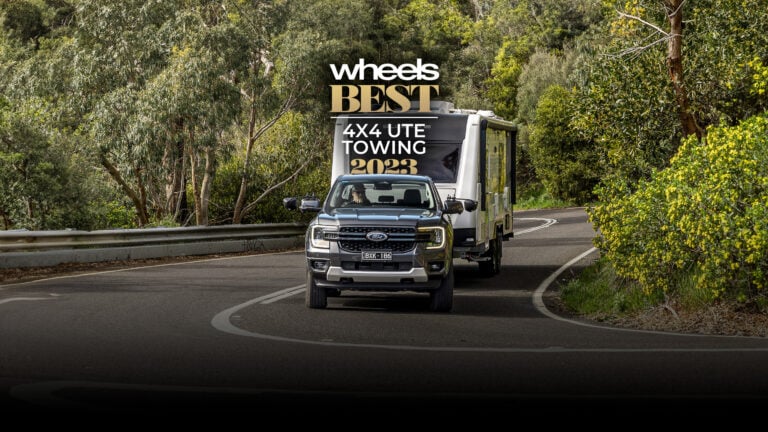 Best Utes
Best UtesBest Ute for Towing
When it comes to the important task of towing, it's a straight fight between the Ford Ranger and VW Amarok twins in the mid-size ute class.
-
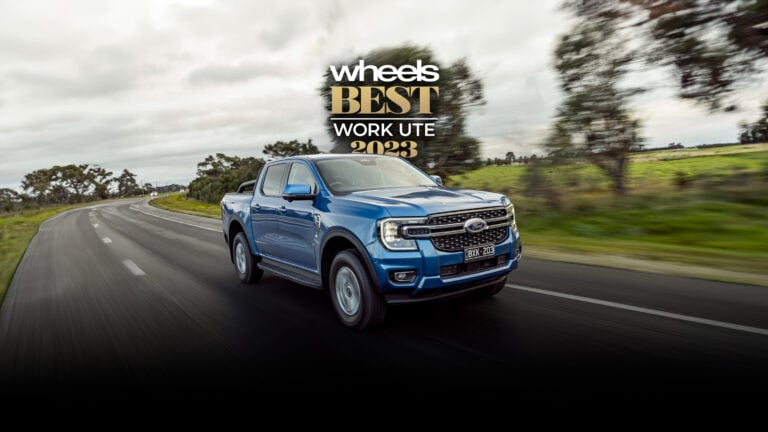 Best Utes
Best Utes2023 Best Work Ute: Ford Ranger XLT
Are you a tradie in the market for a new ute? You’ve come to the right place, because we are rounding up what we think are the top five 4x4 tradie utes available in Australia right now.

